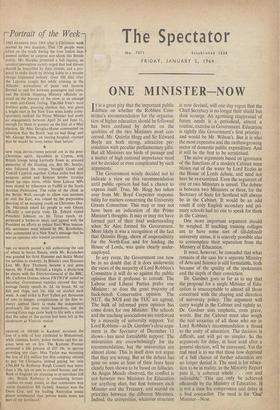Portrait of the Week— T 19 63 FILTERED INTO 1964 after a
Christmas week , marred by two disasters, That 120 people were killed on the roads during the four festive days seemed neither to surprise nor shock the British public. Mr. Marples promised a full inquiry, an accident prevention society urged that bad drivers should be boycotted by their friends, and a pro- posal to make death by driving liable to a murder charge frightened nobody. Over 100 died after the Lakonia caught fire while cruising in the Atlantic: accusations of panic and hysteria flurried to and fro between passengers and crew, and the Greek Shipping Ministry officially in- sisted on the bravery of the crew, in an attempt to stem anti-Greek feeling. The-Old Year's most fruitless game, guessing election day, was given a bright start in the New Year when lobby corre- spondents realised the Prime Minister had made no engagements between April 24 and June 11, enough for them to pounce on the hint of a May election. Sir Alec Douglas-Home commented on television that the Bomb 'was no bad thing' and Mr. George Brown, on leaving hospital, claimed that he would be 'even better than before.'
*
NEW YEAR REVOLUTIONS petered out in the post- Christmas spirit. Squabbles in Cyprus, with British troops being hurriedly flown in, aroused memories of the Harding era. But Mr. Sandys, who followed the troops, brought Greek and Turkish Cypriots together. Cuban exiles had their weapons seized and Kenyan border troubles flared up once more, while three Labour MPs were stoned by tribesmen at Fadhli in the South Arabian Federation. The value of the chink in the Berlin Wall, enough to allow vast numbers to visit the East, was ruined by the purposeless shooting of an escaping youth on Christmas Day. Dr. Nkrumah asked his people to vote Ghana officially a one-party state. Dr. Erhard visited President Johnson on his Texas ranch, ex- perienced a barbecue meal, and'agreed with the President on efforts to reduce East/West tension. His sentiments were echoed by Mr. Krushchev, who commented in a New Year's message that he was an optimist who wanted co-existence.
*
THE US SENATE passed a bill authorising the sale of wheat to Soviet Russia, while Mr. Krushchev was granted his third Hammer and Sickle Medal for services to rocketry. In Britain's own Honours List, Mr. Roy Thomson became a real press baron, Mr. Frank Worrell a knight, a distinction he shares with the Director-General of the BBC, Mr. Carleton Greene, whose TWTWTW ended on Saturday. Government statistics showed that the average family spends 6s. 2d. on bread, 9d. on fish and chips, and 14s. 64d. on alcohol each week. A steel strike in Port Talbot put thousands of jobs in danger, complications in the film in- dustry seemed likely to make the independent producer's life even more hazardous, and the missing Goya saga came back to life with a claim that the ashes of the picture had been left in the cloakroom at Victoria station.
*
CROWDS OF 100,000 in Kashmir mourned the loss of a relic of hair attributed to Mohammed, while cinemas, hotels, police stations and fire en- gines were set on fire. The Kashmir Premier promised a life pension of £37 10s. to anyone providing any clues. Miss Taylor was mourning the loss of £14 million her film company refused to pay for Cleopatra, instead paying her only £766,464 5s. Rothesay Burgh Council may intro-
' duce a 10s. tax on pets in council houses, and the Bank of England are planning to re-introduce £10 otes. British Railways is considering lecture- oaches on some routes, so that commuters may :ntitle themselves BR (failed). America won the Davis Cup, and the leading Australian tennis player commented that 'private tennis tours are part of my livelihood.'






























 Previous page
Previous page